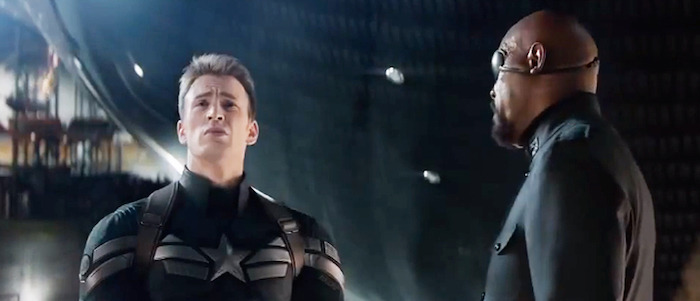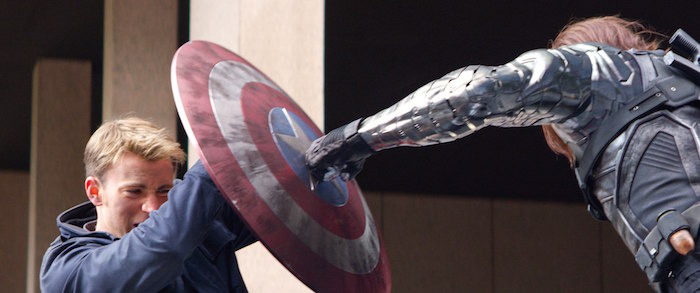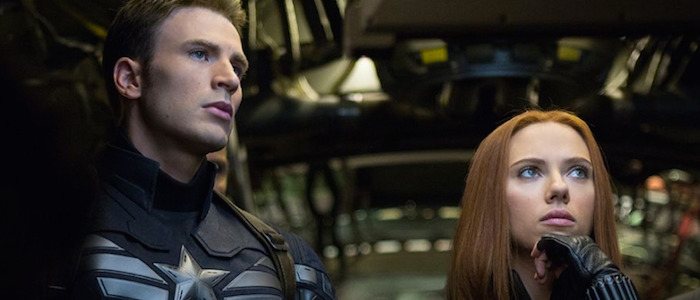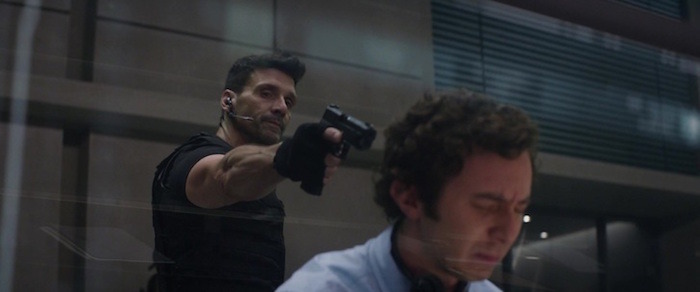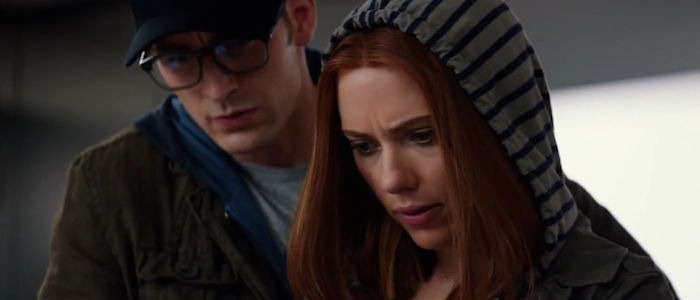'Captain America: The Winter Soldier' Is The First Marvel Masterwork
(Welcome to Road to Infinity War, a new series where we revisit the first 18 movies of the Marvel Cinematic Universe and ask "How did we get here?" In this edition: Marvel Studios finally finds the perfect blend of character and politics in Captain America: The Winter Soldier.)
Nine films into its now 18 entries, the Marvel Cinematic Universe found its groove in a major way. The series' prior imbalance was owed to both occasionally muddled character arcs and often-incoherent worldviews, capturing the superficial texture of post-9/11 geopolitics without anything more significant. That superficiality has been a sticking point on the "Road to Infinity War" even for some of the series' very best entries because of how their political backdrop has been contextualized. It's always treated as key thematic focus rather than mere allusion, even though it often only amounts to the latter.
As you may have read in this series of articles, much of Marvel's political outlook is lip-service to prop up their heroes so their journeys can relate to their immediate antagonists, and their immediate antagonists alone. The result is at the very least a partial thematic void, even when the characters work. The MCU lacked, for the most part, any substantial use of the American "war on terror" which lies constantly in its peripheries.
That is, until Captain America: The Winter Soldier.
Many consider The Winter Soldier to be a major series high-point. It's perhaps the only film until Black Panther that comes close to truly critiquing the "military" element of the military industrial complex, despite still being hindered by the weight of the larger franchise. Though of course, as important as backdrop is to weaving narrative, it's still secondary at the end of the day. Articulating it thoughtfully, or at least more thoughtfully than prior Marvel films, still requires a character-centric story to ground it and to hold the action together. That's what tends to make a good movie, and The Winter Soldier is one of Marvel's best.
The Big Reveal
Understanding The Winter Soldier requires talking about its midpoint, where what the film is truly about comes into focus. Now fugitives from a recently compromised S.H.I.E.L.D., a defense branch of the American government, Steve Rogers/Captain America and Natasha Romanoff/Black Widow track down a mysterious data point. They discover, embedded deep within S.H.I.E.L.D.'s very birthplace, Steve's World War II enemy Arnim Zola (Toby Jones), or rather, his digitized consciousness. As it turns out, the real-life Operation Paperclip which folded former Nazi scientists into American intelligence efforts resulted in HYDRA (the Nazi science division from Captain America: The First Avenger) slowly spreading its fascist ideology within U.S. ranks. As it stands, HYDRA and S.H.I.E.L.D. are effectively one and the same, and they plan to kill anyone who might oppose them.
In previous Marvel efforts (like all three Iron Man films), the villainous plan often had a political façade with something more cartoonishly sinister lurking underneath. The Winter Soldier flips the script in that regard, retrofitting ridiculous-sounding elements like secret super-Nazis, a man in a computer, and even Batroc The Leaper and making them part of a larger political fabric. On the surface, and to any character outside the situation, HYDRA's "Project Insight" is a Government takeover that involves killing people because a computer program ("Zola's Algorithm") said so. Underneath that however, it's driven by both in-universe history and ideology, and real-world politics, as much as its metaphor might be muddled.
HYDRA is no longer a foreign threat like it was in World War II. Rather than infiltrating America from the outside, it has grown to become part of American government itself. It is made up of American military personnel at every level, from pilots to a member of the World Council. The Winter Soldier comic's Aleksander Lukin, a former KGB-op and modern day vessel for the Red Skull himself, shows up in the film as Alexander Pierce (Robert Redford), an American vessel for HYDRA's ideas. He has always been American, and his methods are drawn from America's real-world foreign and domestic policies. "Zola's Algorithm" is essentially threat analysis through data-mining, not unlike the NSA secrets exposed by Edward Snowden.
"Project Insight," the algorithm's next phase, involves drone ships picking off targets who may pose a threat to HYDRA's self-perceived global security. Or, as Steve Rogers calls it, "Holding a gun at everyone on Earth and calling it protection." Functionally, it is very much American military apparatus working in the shadows, killing and spying with impunity, and causing Steve and Natasha to realize they might not have been working for the good guys after all.
On the other hand, having a formerly Nazi organization – from its logo to its salute phrase – be revealed to have been pulling the strings is a bit of a mixed message. It arguably makes it too easy for Steve and Natasha to come to terms with their misguided allegiances, since they never perceived HYDRA to be the good guys in the first place. Project Insight's immediate targets are mostly Americans on domestic soil, an immediately horrifying image from an American perspective, but one that's largely disconnected from its real-world equivalent: the constantly self-justified preemptive killings of targets in the Middle East and the ensuing collateral damage.
Metaphors are a fantastic tool for genre storytelling, but when dealing with the overlap of opposing forces, they can still go both ways. A story such as this, while arguably intended to be read as Steve Rogers discovering the damage America is doing to the world, has its impact lessened given that Captain America (draped in his red, white and blue once again by film's end) is ultimately an idea. In literal terms, the idea is a soldier carrying the American flag to battle Nazis – one of the unambiguous villains of World War II – and their plan to carry out mass murder in modern day.
But of course, these two extremes of interpretation exist independently of the actual story. The truth, if there is one singular truth, likely exists somewhere in between. Unpacking a film's politics through its plot alone isn't quite the same as unpacking it while that plot interacts with its characters. It's exactly that element of The Winter Soldier – the people driving the story, their perspectives, and how they interact with this changing world – that makes it such fantastic piece of blockbuster cinema.
Every scene and every dialogue exchange comes from a place of opposing perspectives, building on characters bit by bit as they respond to the plot. You could write an entire essay about any individual scene (trust me, I considered it – the film is meticulously detailed and structured), and Steve Rogers having to recalibrate his loyalties works as a character-centric story regardless of whether it's tied thematically to strictly America, strictly Nazis, or something in between. But the one scene that stands out the most in the film's first half, both from an emotional and thematic standpoint, is when Steve visits his long-lost love, Peggy Carter.
Ghosts of the Past
Steve Rogers was lost to time itself in World War II, after which Peggy had to move on without him. Seventy years later, he still visits her at her nursing home, seeking advice from the woman who owed him a dance but has lived a full life since. It isn't just Steve's confusion about his current circumstances that's articulated here – now a spy for S.H.I.E.L.D., he tells her he wants to keep doing right, though he no longer knows what that is – but also the need for him to find his place in the present, given his relationship to the past.
Natasha jokes about him being a fossil at the Smithsonian – he knows his place in this dynamic, joking about barbershop quartets in return – but the museum has, in fact, idealized him and his comrades in the form of an exhibit. Steve now works in the shadows for men who compartmentalize secrets and carry out covert missions they don't put America's name to. His uniform is stripped of all colour, inspired by the outfit he wore in the comics after giving up his American mantle. Past idealism is compass he can no longer follow since it no longer seems to apply. It's this museum trip that leads him to Peggy for guidance, but Peggy keeps forgetting he's alive and lost in an unfamiliar time. To her, he's still frozen in an era where the colours were bright, and the answers were easy. The past remembers Captain America, but it's forgetting Steve Rogers.
In Captain America: The First Avenger, the only other major character who knew Steve when he was still a scrawny kid from Brooklyn was his best friend, Sgt. James Buchanan Barnes. "Bucky," as he was affectionately known, survived his icy plunge just as Steve did, though unbeknownst to Steve, Bucky was captured by the other side. He's both the inverse Captain America, and the other side of the American coin. He's The Winter Soldier, HYDRA's key assassin shaping history from the shadows like a super-powered CIA operative, but he's also a dark mirror to Steve. His memory, and thus morality, have been wiped. He follows orders without question. He is everything Steve fears he may become if he loses his way, and losing his way has become all too easy when answering to any authority might be dangerous. And it's here that Steve Rogers learns that morality... is the friends we made along the way.
No, really.
Ghosts in the Present
Steve Rogers is a fixed point in a rapidly evolving world. His narrative function is not to change, but to change those around him, especially those who find themselves lost and in search of purpose. That means Natasha Romanoff, the expert former KGB assassin who still gets her hands dirty. That means Sam Wilson, AKA The Falcon, a former soldier trying his best to do good. And that means S.H.I.E.L.D. Director Nick Fury, a man whose secrets have secrets, and a leader whose inability to surround himself with people he trusts has makes him an unwitting pawn.
Fury believes in prevention. His upbringing involved his grandfather carrying a loaded gun to ward off muggers, a philosophy he magnifies in the form of S.H.I.E.L.D.'s new long-range gunships. While he himself would likely not seek to use them on civiliians – he senses something is off with "Insight," so he begins to investigate – his continued belief in the power structure he sits atop catalyzes his downfall. To him, the problem is likely rogue elements within S.H.I.E.L.D. rather than S.H.I.E.L.D. itself, an organization tasked with deciding who gets to live or die. When faced with what to do next, he hopes to salvage S.H.I.E.L.D. from the individuals who have tarnished it, but Steve Rogers knows better and harshly convinces him otherwise. Steve has seen what happens when power corrupts; just as there were no good Nazis in World War II, S.H.I.E.L.D. itself must go. It's grown too powerful to be controlled responsibly, even if HYDRA is weeded out.
Like Fury, Natasha believes in S.H.I.E.L.D. – at first. She switched allegiances from the KGB to the White House, believing herself to finally be on the side of right, but this wasn't a decision she was capable of making. Not when her very identity was flux, moving from cover to cover as she did what needed to be done no matter the cost. Without figuring out who she was outside of these structures and secret identities, and whom she was willing to trust, she had no way of drawing a line when it came to what she was willing to do. Now working as Fury's personal thief, how far would she go in service of her new badge when she had no compass telling her when enough was enough? She still has red in her ledger, violent acts from her past (also referenced in The Avengers) that weigh her down, and the more recent ones weigh on her further when she realizes she may have done them in service of the wrong side once more.
The truth has been "a matter of circumstance" to her for some time. She sees Steve's old-world, honest perspective as out of its depth, and tells him he's in the wrong line of work if he hopes to have friends. She even teaches him to lie and to hide in plain sight. But it's when Captain America becomes divorced, in a way, from America itself and the two go on the run that she sees a man representing truth and justice when his structures no longer can. He carries her to safety after S.H.I.E.L.D. drops a bomb on them, and it's here that she learns that trust – something between two people, rather than between a spy and her government – is what's going to keep her alive. She has a new willingness to be seen, owing to Steve looking beyond her misdeeds and viewing her as a friend despite her lies to him. And it allows her to blow the whistle on S.H.I.E.L.D. without hesitation, dumping all their dirty secrets onto the internet – even the ones involving her ugly past.
Which brings us, of course, to Sam Wilson. A social worker-turned superhero in the comics, this version of Sam is a military veteran who retains the core of his comicbook counterpart. He's first and foremost a helper, working to counsel other veterans afflicted by guilt, regret and PTSD, while his own guilt over not being able to protect his partner caused him to leave the field. He immediately gets along with Steve, recognizing their common inability to re-adjust to the world, and when Steve comes asking for his help, he doesn't hesitate. His journey certainly isn't as complicated as Fury's or Natasha's – rather than a solider or spy with shady dealings, he was explicitly a rescue operative – but he serves as an embodiment of the kind of change Steve Rogers inspires at large: the desire to fight for good. Like a kid getting to see his favourite superhero up close, "Dude, Captain America needs my help" is reason enough for him to take to the skies once more.
Fighting the Good Fight
Captain America's mission during the climax doesn't involve punching bad guys. Most of the punching is incidental, on his way to replacing the gunships' trackers so they eventually destroy one another, His first stop is infiltrating a S.H.I.E.L.D control room. Danny Pudi (Community's Abed), despite being held at gunpoint, guides him towards the control panels. It's as if he's inviting him in willingly, having sensed that the fugitive has a good reason to be there. He does. Speaking to all of S.H.I.E.L.D., or those who would listen, he lays the facts out in front of them, even at the cost of attracting HYDRA's attention.
No more secrets. No more hiding. "The cost of freedom is high," but it's a price Captain America is willing to pay, and he's right to believe he isn't the only one. Among those willing to resist HYDRA is a low-ranking technician played by Aaron Himelstein, tasked with launching HYDRA's gunships in order to, much like the World Council's nuclear launch in The Avengers, kill millions to protect billions. The character has since been given his own name and Marvel Wiki page despite only appearing in one scene here (say hello to Cameron Klien). He then shows up in Avengers: Age of Ultron to rapturous applause, at least at this writer's opening night screening. He has no superpowers, and no real stature or physical strength with which to fight back, but the reason he struck such a chord with fans is because he fought back anyway.
"I'm not gonna launch those ships. Captain's orders."
With one single line, delivered not fearlessly, but cowering at gunpoint, the (then) nameless featured extra embodied everything that makes Captain America matter. Steve Rogers, the little guy from Brooklyn, gives other little guys the strength to stand up. "Captains orders," repeats Emily VanCamp's Sharon, a formerly duplicitous agent now choosing a side. Soon, the whole room of technicians draws their guns on HYDRA's strike team led by Brock Rumlow (Frank Grillo, career Tough Guy), a room full of ill-equipped heroes doing what little they can to fight back.
Till the End of the Line
Captain America refuses to leave the crashing gunship without first freeing Bucky from debris. This isn't the only thing that makes him a hero. It's also the fact that he lingers even longer to remind Bucky of the person he once was. The past is all but lost to Steve Rogers. He's begun the process of tearing the old world down by destroying S.H.I.E.L.D., but he sticks it out with Bucky as the ship goes down, dropping his guard entirely. Like the room full of technicians, Bucky eventually does the right things too, even though he's far from the person he once was.
Bucky doesn't quite remember Steve. He's been subjected to torture too often and had his mind wiped too many times. But still he saves Steve from another watery grave, having been reminded of something deep within him, as this man, merely his mission, a stranger who ought to have every reason to kill him, treats him in a way he hasn't been treated in decades: like a friend.
That's why Captain America works. He isn't just a hero on his own. Whether it's Sam, Natasha, Nick Fury, Bucky, or some nameless kid at a desk, Steve Rogers reminds other people of their own intrinsic goodness. He reminds ordinary folks like you and me that we can be heroes too.

